
Mono
Related Docs:
object Mono
| package publisher





Join the termination signals from this mono and another source into the returned void mono

Transform this Mono into a target type.
Transform this Mono into a target type.
mono.as(Flux::from).subscribe()
the returned instance type
the { @link Function} applying this { @link Mono}
the transformed { @link Mono} to instance P
Mono.compose for a bounded conversion to org.reactivestreams.Publisher



Intercepts the onSubscribe call and makes sure calls to Subscription methods only happen after the child Subscriber has returned from its onSubscribe method.
Intercepts the onSubscribe call and makes sure calls to Subscription methods only happen after the child Subscriber has returned from its onSubscribe method.
This helps with child Subscribers that don't expect a recursive call from onSubscribe into their onNext because, for example, they request immediately from their onSubscribe but don't finish their preparation before that and onNext runs into a half-prepared state. This can happen with non Reactor based Subscribers.
non reentrant onSubscribe Mono

Block until a next signal is received, will return null if onComplete, T if onNext, throw a
Exceptions.DownstreamException if checked error or origin RuntimeException if unchecked.
Block until a next signal is received, will return null if onComplete, T if onNext, throw a
Exceptions.DownstreamException if checked error or origin RuntimeException if unchecked.
If the default timeout 30 seconds has elapsed,a RuntimeException will be thrown.
Note that each block() will subscribe a new single (MonoSink) subscriber, in other words, the result might miss signal from hot publishers.

maximum time period to wait for before raising a RuntimeException
T the result

Block until a next signal is received, will return null if onComplete, T if onNext, throw a
Exceptions.DownstreamException if checked error or origin RuntimeException if unchecked.
Block until a next signal is received, will return null if onComplete, T if onNext, throw a
Exceptions.DownstreamException if checked error or origin RuntimeException if unchecked.

T the result


Turn this Mono into a hot source and cache last emitted signals for further Subscriber.

Prepare this Mono so that subscribers will cancel from it on a specified reactor.core.scheduler.Scheduler.

Cast the current Mono produced type into a target produced type.


Defer the given transformation to this Mono in order to generate a target Mono type.
Defer the given transformation to this Mono in order to generate a target Mono type. A transformation will occur for each org.reactivestreams.Subscriber.
flux.compose(Mono::from).subscribe()
the item type in the returned org.reactivestreams.Publisher
the function to immediately map this Mono into a target Mono instance.
a new Mono
Mono.as for a loose conversion to an arbitrary type

Concatenate emissions of this Mono with the provided Publisher (no interleave).

Provide a default unique value if this mono is completed without any data
Provide a default unique value if this mono is completed without any data

the alternate value if this sequence is empty
a new Mono

Delay this Mono element (Subscriber.onNext signal) by a given Duration, on a particular Scheduler.
Delay this Mono element (Subscriber.onNext signal) by a given Duration, on a particular Scheduler. Empty monos or error signals are not delayed.
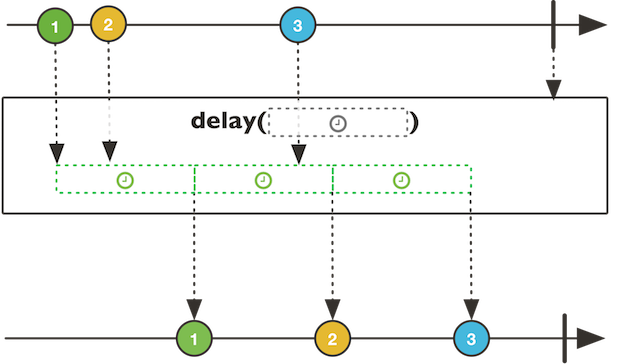
Note that the scheduler on which the mono chain continues execution will be the scheduler provided if the mono is valued, or the current scheduler if the mono completes empty or errors.
Duration by which to delay the { @link Subscriber#onNext} signal
a time-capable Scheduler instance to delay the value signal on
a delayed Mono

Delay this Mono element (Subscriber.onNext signal) by a given duration.
Delay this Mono element (Subscriber.onNext signal) by a given duration. Empty Monos or error signals are not delayed.

Note that the scheduler on which the Mono chain continues execution will be the parallel scheduler if the mono is valued, or the current scheduler if the mono completes empty or errors.
duration by which to delay the Subscriber.onNext signal
a delayed Mono

Delay the subscription to this Mono until another Publisher signals a value or completes.
Delay the subscription to this Mono until another Publisher signals a value or completes.

the other source type
a Publisher to signal by next or complete this Mono.subscribe
a delayed Mono

Delay the subscription to this Mono source until the given Duration elapses.
Delay the subscription to this Mono source until the given Duration elapses.
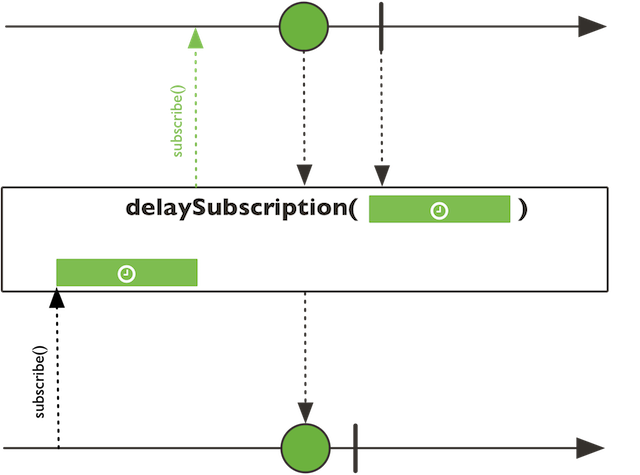

Delay the subscription to this Mono source until the given period elapses.
Delay the subscription to this Mono source until the given period elapses.


Subscribe to this Mono and another Publisher that is generated from this Mono's element and which will be used as a trigger for relaying said element.
Subscribe to this Mono and another Publisher that is generated from this Mono's element and which will be used as a trigger for relaying said element.
That is to say, the resulting Mono delays until this Mono's element is emitted, generates a trigger Publisher and then delays again until the trigger Publisher terminates.
Note that contiguous calls to all delayUntil are fused together. The triggers are generated and subscribed to in sequence, once the previous trigger completes. Error is propagated immediately downstream. In both cases, an error in the source is immediately propagated.
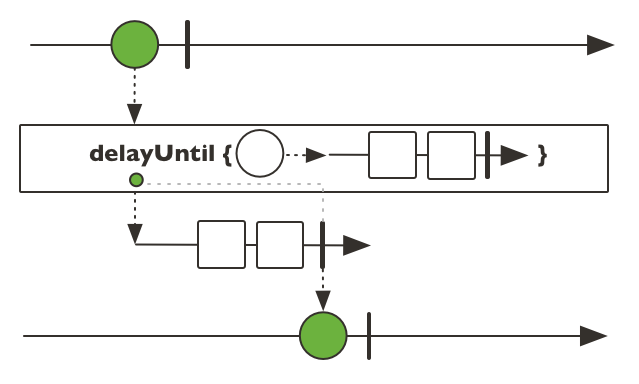
a Function1 that maps this Mono's value into a Publisher whose termination will trigger relaying the value.
this Mono, but delayed until the derived publisher terminates.

A "phantom-operator" working only if this Mono is a emits onNext, onError or onComplete reactor.core.publisher.Signal.
A "phantom-operator" working only if this Mono is a emits onNext, onError or onComplete reactor.core.publisher.Signal. The relative org.reactivestreams.Subscriber callback will be invoked, error reactor.core.publisher.Signal will trigger onError and complete reactor.core.publisher.Signal will trigger onComplete.

the dematerialized type
a dematerialized Mono

Triggered after the Mono terminates, either by completing downstream successfully or with an error.
Triggered after the Mono terminates, either by completing downstream successfully or with an error. The arguments will be null depending on success, success with data and error:

the callback to call after org.reactivestreams.Subscriber.onNext, org.reactivestreams.Subscriber.onComplete without preceding org.reactivestreams.Subscriber.onNext or org.reactivestreams.Subscriber.onError
a new Mono

Add behavior (side-effect) triggered after the Mono terminates, either by completing downstream successfully or with an error.


Triggered when the Mono is cancelled.

Triggered when the Mono completes with an error matching the given exception.

Triggered when the Mono completes with an error matching the given exception type.

Triggered when the Mono completes with an error.


Attach a Long consumer to this Mono that will observe any request to this Mono.

Triggered when the Mono is subscribed.

Triggered when the Mono completes successfully.

Add behavior triggered when the Mono terminates, either by completing successfully or with an error.

Map this Mono sequence into scala.Tuple2 of T1 Long timemillis and T2
T associated data.
Map this Mono sequence into scala.Tuple2 of T1 Long timemillis and T2
T associated data. The timemillis corresponds to the elapsed time between the subscribe and the first
next signal.
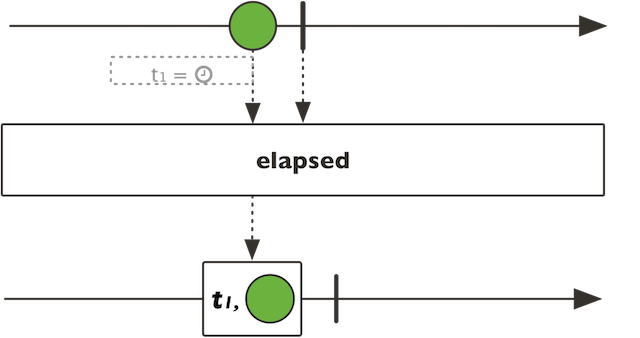
the Scheduler to read time from
a transforming Mono that emits a tuple of time elapsed in milliseconds and matching data

Map this Mono sequence into scala.Tuple2 of T1 Long timemillis and T2
T associated data.



Recursively expand elements into a graph and emit all the resulting element using a breadth-first traversal strategy.
Recursively expand elements into a graph and emit all the resulting element using a breadth-first traversal strategy.
That is: emit the value from this Mono first, then it each at a first level of recursion and emit all of the resulting values, then expand all of these at a second level and so on...
For example, given the hierarchical structure
A
- AA
- aa1
- AB
- ab1
- a1
Expands Mono.just(A) into
A AA AB a1 aa1 ab1
the Function1 applied at each level of recursion to expand values into a Publisher, producing a graph.
this Mono expanded breadth-first to a Flux

Recursively expand elements into a graph and emit all the resulting element using a breadth-first traversal strategy.
Recursively expand elements into a graph and emit all the resulting element using a breadth-first traversal strategy.
That is: emit the value from this Mono first, then it each at a first level of recursion and emit all of the resulting values, then expand all of these at a second level and so on...
For example, given the hierarchical structure
A
- AA
- aa1
- AB
- ab1
- a1
Expands Mono.just(A) into
A AA AB a1 aa1 ab1
the Function1 applied at each level of recursion to expand values into a Publisher, producing a graph.
a capacity hint to prepare the inner queues to accommodate n elements per level of recursion.
this Mono expanded breadth-first to a Flux

Recursively expand elements into a graph and emit all the resulting element, in a depth-first traversal order.
Recursively expand elements into a graph and emit all the resulting element, in a depth-first traversal order.
That is: emit the value from this Mono, expand it and emit the first value at this first level of recursion, and so on... When no more recursion is possible, backtrack to the previous level and re-apply the strategy.
For example, given the hierarchical structure
A
- AA
- aa1
- AB
- ab1
- a1
Expands Mono.just(A) into
A AA aa1 AB ab1 a1
the Function1 applied at each level of recursion to expand values into a Publisher, producing a graph.
this Mono expanded depth-first to a Flux

Recursively expand elements into a graph and emit all the resulting element, in a depth-first traversal order.
Recursively expand elements into a graph and emit all the resulting element, in a depth-first traversal order.
That is: emit the value from this Mono, expand it and emit the first value at this first level of recursion, and so on... When no more recursion is possible, backtrack to the previous level and re-apply the strategy.
For example, given the hierarchical structure
A
- AA
- aa1
- AB
- ab1
- a1
Expands Mono.just(A) into
A AA aa1 AB ab1 a1
the Function1 applied at each level of recursion to expand values into a Publisher, producing a graph.
a capacity hint to prepare the inner queues to accommodate n elements per level of recursion.
this Mono expanded depth-first to a Flux

Test the result if any of this Mono and replay it if predicate returns true.

If this Mono is valued, test the value asynchronously using a generated Publisher[Boolean] test.
If this Mono is valued, test the value asynchronously using a generated
Publisher[Boolean] test. The value from the Mono is replayed if the
first item emitted by the test is true. It is dropped if the test is
either empty or its first emitted value is false.
Note that only the first value of the test publisher is considered, and unless it is a Mono, test will be cancelled after receiving that first value.
the function generating a Publisher of Boolean to filter the Mono with
a filtered Mono


Transform the item emitted by this Mono asynchronously, returning the value emitted by another Mono (possibly changing the value type).

Transform the item emitted by this Mono into Iterable, , then forward its elements into the returned Flux.
Transform the item emitted by this Mono into Iterable, , then forward its elements into the returned Flux. The prefetch argument allows to give an arbitrary prefetch size to the inner Iterable.
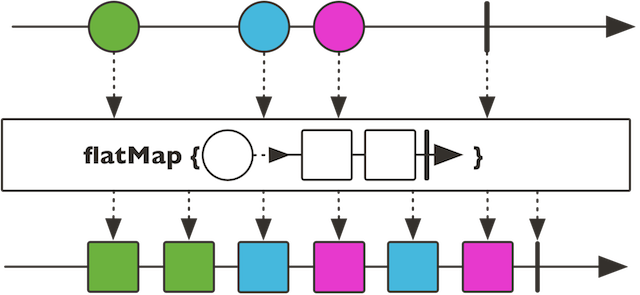
the merged output sequence type
the Function1 to transform input item into a sequence Iterable
a merged Flux

Transform the signals emitted by this Mono into a Publisher, then forward its emissions into the returned Flux.
Transform the signals emitted by this Mono into a Publisher, then forward its emissions into the returned Flux.
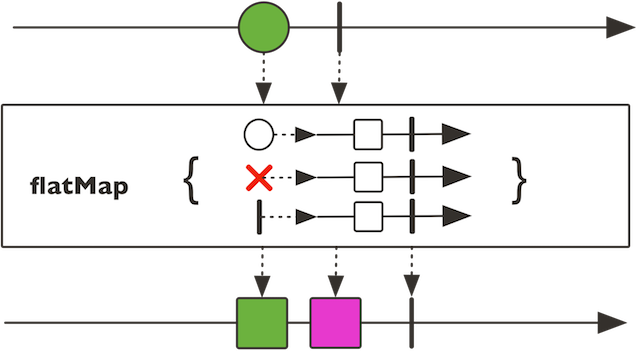
the type of the produced inner sequence
the Function1 to call on next data and returning a sequence to merge
theFunction1 to call on error signal and returning a sequence to merge
the Function1 to call on complete signal and returning a sequence to merge
a new Flux as the sequence is not guaranteed to be single at most

Transform the item emitted by this Mono into a Publisher, then forward its emissions into the returned Flux.



Handle the items emitted by this Mono by calling a biconsumer with the output sink for each onNext.

Emit a single boolean true if this Mono has an element.


Hides the identity of this Mono instance.

Ignores onNext signal (dropping it) and only reacts on termination.
Ignores onNext signal (dropping it) and only reacts on termination.
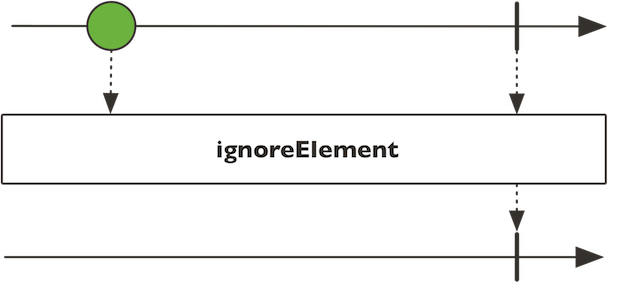
a new completable Mono.



Observe Reactive Streams signals matching the passed filter options and
use reactor.util.Logger support to
handle trace
implementation.
Observe Reactive Streams signals matching the passed filter options and
use reactor.util.Logger support to
handle trace
implementation. Default will
use the passed Level and java.util.logging. If SLF4J is available, it will be used instead.
Options allow fine grained filtering of the traced signal, for instance to only capture onNext and onError:
mono.log("category", Level.INFO, SignalType.ON_NEXT, SignalType.ON_ERROR)
 @param category to be mapped into logger configuration (e.g. org.springframework
.reactor). If category ends with "." like "reactor.", a generated operator
suffix will complete, e.g. "reactor.Mono.Map".
@param level the [[Level]] to enforce for this tracing Mono (only FINEST, FINE,
INFO, WARNING and SEVERE are taken into account)
@param showOperatorLine capture the current stack to display operator
class/line number.
@param options a vararg [[SignalType]] option to filter log messages
@return a new unaltered [[Mono]]
@param category to be mapped into logger configuration (e.g. org.springframework
.reactor). If category ends with "." like "reactor.", a generated operator
suffix will complete, e.g. "reactor.Mono.Map".
@param level the [[Level]] to enforce for this tracing Mono (only FINEST, FINE,
INFO, WARNING and SEVERE are taken into account)
@param showOperatorLine capture the current stack to display operator
class/line number.
@param options a vararg [[SignalType]] option to filter log messages
@return a new unaltered [[Mono]]

Observe Reactive Streams signals matching the passed flags options and use
reactor.util.Logger support to handle trace implementation.
Observe Reactive Streams signals matching the passed flags options and use
reactor.util.Logger support to handle trace implementation. Default will use the passed
Level and java.util.logging. If SLF4J is available, it will be used instead.
Options allow fine grained filtering of the traced signal, for instance to only capture onNext and onError:
mono.log("category", SignalType.ON_NEXT, SignalType.ON_ERROR)
 @param category to be mapped into logger configuration (e.g. org.springframework
.reactor). If category ends with "." like "reactor.", a generated operator
suffix will complete, e.g. "reactor.Flux.Map".
@param level the { @link Level} to enforce for this tracing Mono (only FINEST, FINE,
INFO, WARNING and SEVERE are taken into account)
@param options a vararg [[SignalType]] option to filter log messages
@return a new [[Mono]]
@param category to be mapped into logger configuration (e.g. org.springframework
.reactor). If category ends with "." like "reactor.", a generated operator
suffix will complete, e.g. "reactor.Flux.Map".
@param level the { @link Level} to enforce for this tracing Mono (only FINEST, FINE,
INFO, WARNING and SEVERE are taken into account)
@param options a vararg [[SignalType]] option to filter log messages
@return a new [[Mono]]

Observe all Reactive Streams signals and use reactor.util.Logger support to handle trace implementation.
Observe all Reactive Streams signals and use reactor.util.Logger support to handle trace implementation. Default will use Level.INFO and java.util.logging. If SLF4J is available, it will be used instead.

to be mapped into logger configuration (e.g. org.springframework .reactor). If category ends with "." like "reactor.", a generated operator suffix will complete, e.g. "reactor.Flux.Map".
a new Mono

Observe all Reactive Streams signals and trace them using reactor.util.Logger support.
Observe all Reactive Streams signals and trace them using reactor.util.Logger support.
Default will use Level.INFO and java.util.logging.
If SLF4J is available, it will be used instead.

The default log category will be "reactor.Mono", followed by a suffix generated from the source operator, e.g. "reactor.Mono.Map".
a new Mono that logs signals
Flux.log()

Transform the item emitted by this Mono by applying a synchronous function to it.
Transform the item emitted by this Mono by applying a synchronous function to it.

the transformed type
the synchronous transforming Function1
a new Mono

Transform the incoming onNext, onError and onComplete signals into Signal.
Transform the incoming onNext, onError and onComplete signals into Signal.
Since the error is materialized as a Signal, the propagation will be stopped and onComplete will be
emitted. Complete signal will first emit a Signal.complete() and then effectively complete the flux.
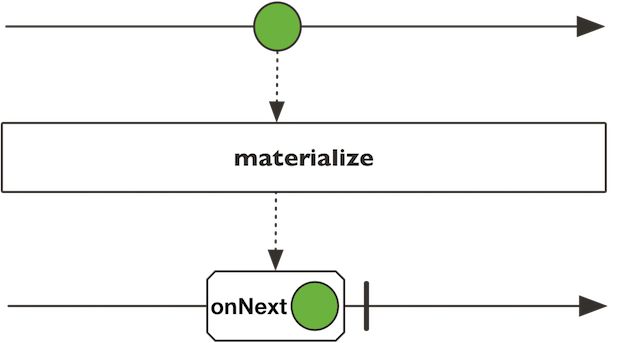
a Mono of materialized Signal

Merge emissions of this Mono with the provided Publisher.

Give a name to this sequence, which can be retrieved using reactor.core.scala.Scannable.name() as long as this is the first reachable reactor.core.scala.Scannable.parents().
Give a name to this sequence, which can be retrieved using reactor.core.scala.Scannable.name() as long as this is the first reachable reactor.core.scala.Scannable.parents().
a name for the sequence
the same sequence, but bearing a name




Evaluate the accepted value against the given Class type.

Transform the error emitted by this Mono by applying a function if the error matches the given predicate, otherwise let the error flow.

Transform the error emitted by this Mono by applying a function if the error matches the given type, otherwise let the error flow.
Transform the error emitted by this Mono by applying a function if the error matches the given type, otherwise let the error flow.
<img class="marble" src="https://raw.githubusercontent.com/reactor/reactor-core/v3.1.0.RC1/src/docs/marble/maperror.png"
the error type
the type to match
the error transforming Function1
a transformed Mono

Transform the error emitted by this Mono by applying a function.

Subscribe to a returned fallback publisher when an error matching the given predicate occurs.

Subscribe to a returned fallback publisher when an error matching the given type occurs.

Subscribe to a returned fallback publisher when any error occurs.
Subscribe to a returned fallback publisher when any error occurs.
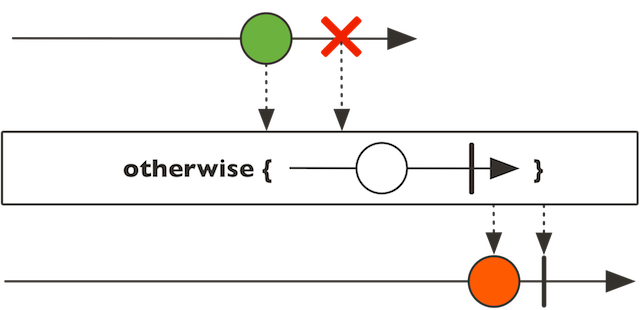
the function to map an alternative { @link Mono}
an alternating Mono on source onError

Simply emit a captured fallback value when an error matching the given predicate is observed on this Mono.
Simply emit a captured fallback value when an error matching the given predicate is observed on this Mono.
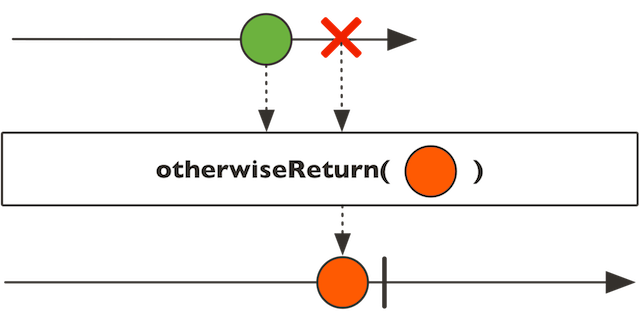
the error predicate to match
the value to emit if a matching error occurs
a new Mono

Simply emit a captured fallback value when an error of the specified type is observed on this Mono.
Simply emit a captured fallback value when an error of the specified type is observed on this Mono.

the error type
the error type to match
the value to emit if a matching error occurs
a new falling back Mono

Simply emit a captured fallback value when any error is observed on this Mono.
Simply emit a captured fallback value when any error is observed on this Mono.

the value to emit if an error occurs
a new falling back Mono

Detaches the both the child Subscriber and the Subscription on termination or cancellation.
Detaches the both the child Subscriber and the Subscription on termination or cancellation.
This should help with odd retention scenarios when running with non-reactor Subscriber.
a detachable Mono

Emit the any of the result from this mono or from the given mono
Emit the any of the result from this mono or from the given mono

the racing other { @link Mono} to compete with for the result
a new Mono

Shares a Mono for the duration of a function that may transform it and consume it as many times as necessary without causing multiple subscriptions to the upstream.

Run onNext, onComplete and onError on a supplied Scheduler
Run onNext, onComplete and onError on a supplied Scheduler
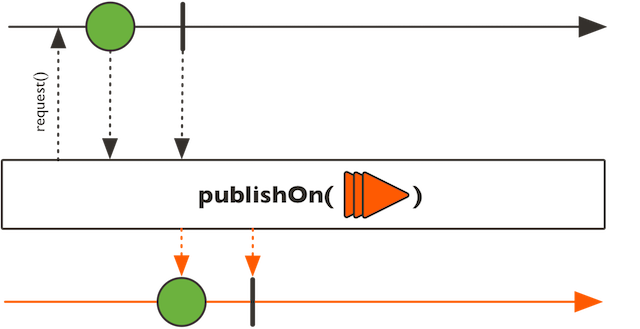
Typically used for fast publisher, slow consumer(s) scenarios.
mono.publishOn(Schedulers.single()).subscribe()
a checked { @link reactor.core.scheduler.Scheduler.Worker} factory
an asynchronously producing Mono

Repeatedly subscribe to the source if the predicate returns true after completion of the previous subscription.
Repeatedly subscribe to the source if the predicate returns true after completion of the previous subscription. A specified maximum of repeat will limit the number of re-subscribe.
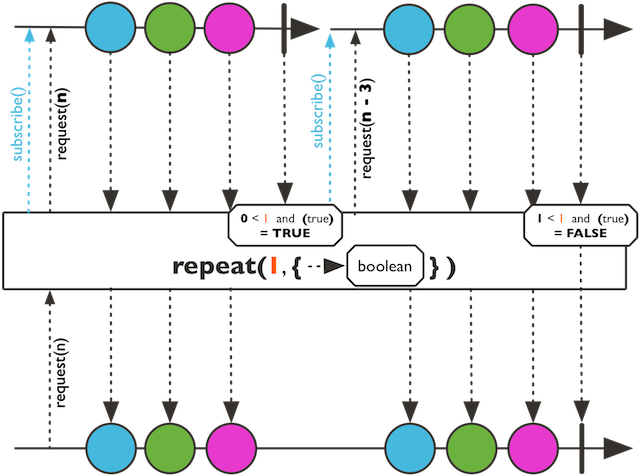
the number of times to re-subscribe on complete
the boolean to evaluate on onComplete
an eventually repeated Flux on onComplete up to number of repeat specified OR matching predicate

Repeatedly subscribe to the source if the predicate returns true after completion of the previous subscription.
Repeatedly subscribe to the source if the predicate returns true after completion of the previous subscription.
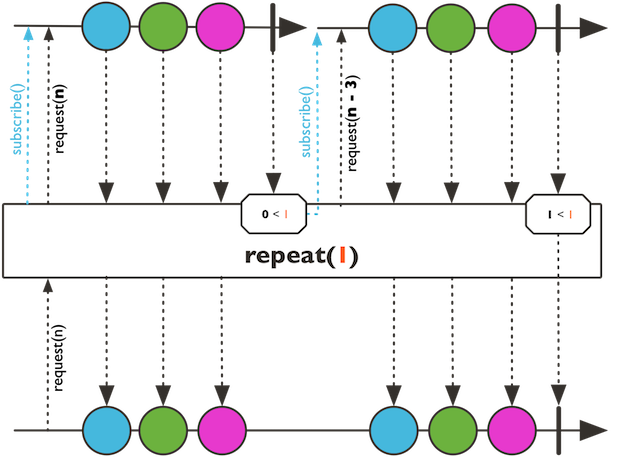
the number of times to re-subscribe on onComplete
an eventually repeated Flux on onComplete up to number of repeat specified

Repeatedly subscribe to the source if the predicate returns true after completion of the previous subscription.
Repeatedly subscribe to the source if the predicate returns true after completion of the previous subscription.
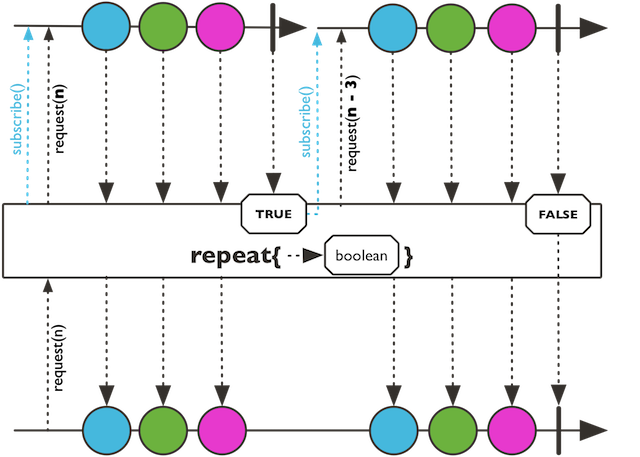
the boolean to evaluate on onComplete.
an eventually repeated Flux on onComplete

Repeatedly subscribe to the source completion of the previous subscription.
Repeatedly subscribe to the source completion of the previous subscription.
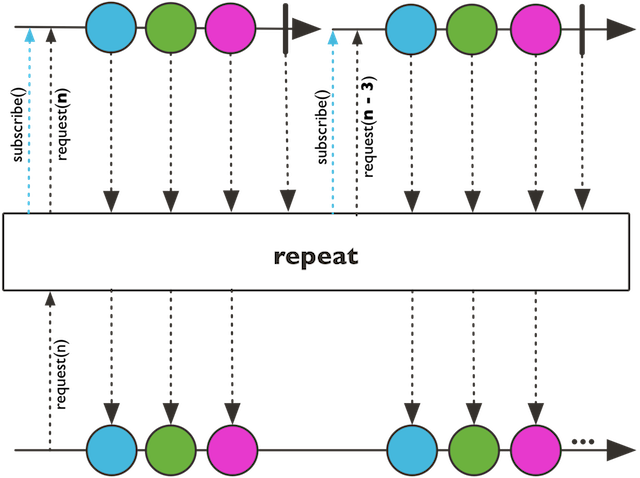
an indefinitively repeated Flux on onComplete

Repeatedly subscribe to this Mono when a companion sequence signals a number of emitted elements in response to the flux completion signal.
Repeatedly subscribe to this Mono when a companion sequence signals a number of emitted elements in response to the flux completion signal.
If the companion sequence signals when this Mono is active, the repeat attempt is suppressed and any terminal signal will terminate this Flux with the same signal immediately.
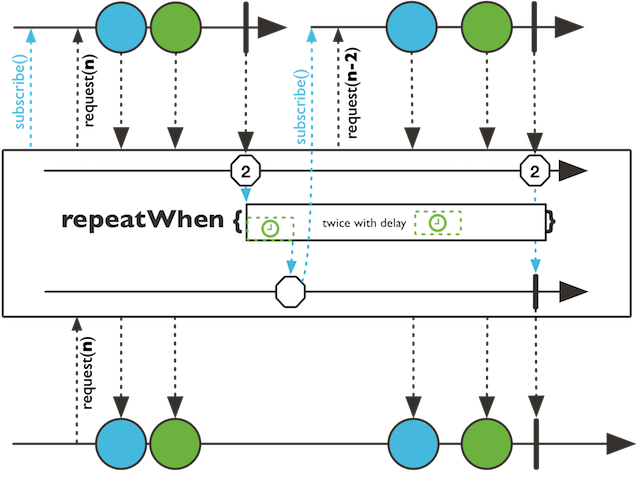

Repeatedly subscribe to this Mono until there is an onNext signal when a companion sequence signals a number of emitted elements.
Repeatedly subscribe to this Mono until there is an onNext signal when a companion sequence signals a number of emitted elements.
If the companion sequence signals when this Mono is active, the repeat attempt is suppressed and any terminal signal will terminate this Mono with the same signal immediately.
Emits an IllegalStateException if the max repeat is exceeded and different from Int.MaxValue.
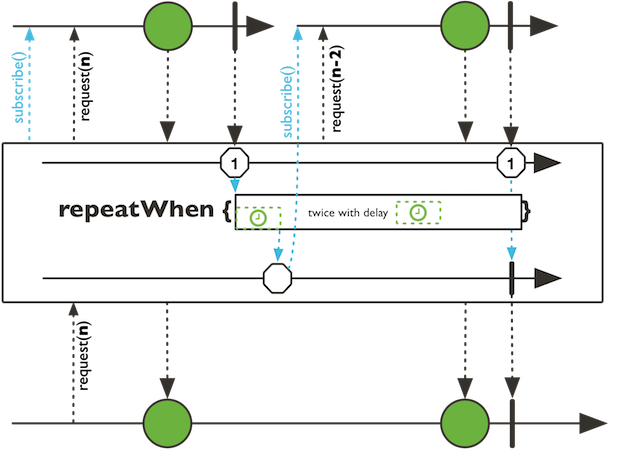
the maximum repeat number of time (infinite if Int.MaxValue)
the Function1 providing a Flux signalling the current repeat index from 0 on onComplete and returning a { @link Publisher} companion.
an eventually repeated Mono on onComplete when the companion Publisher produces an onNext signal

Repeatedly subscribe to this Mono until there is an onNext signal when a companion sequence signals a number of emitted elements.
Repeatedly subscribe to this Mono until there is an onNext signal when a companion sequence signals a number of emitted elements.
If the companion sequence signals when this Mono is active, the repeat attempt is suppressed and any terminal signal will terminate this Mono with the same signal immediately.
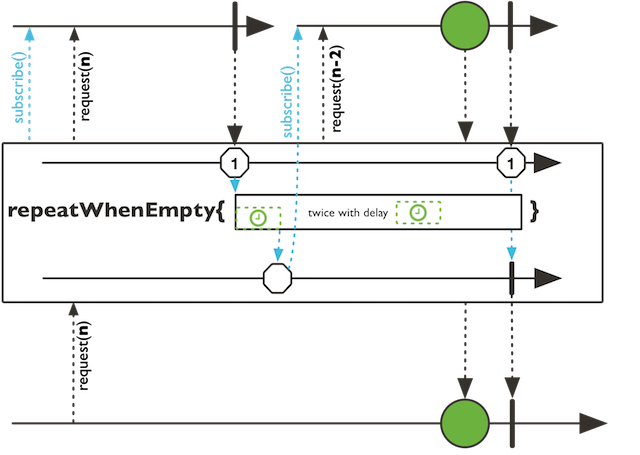

Re-subscribes to this Mono sequence up to the specified number of retries if it signals any
error and the given Predicate matches otherwise push the error downstream.
Re-subscribes to this Mono sequence up to the specified number of retries if it signals any
error and the given Predicate matches otherwise push the error downstream.
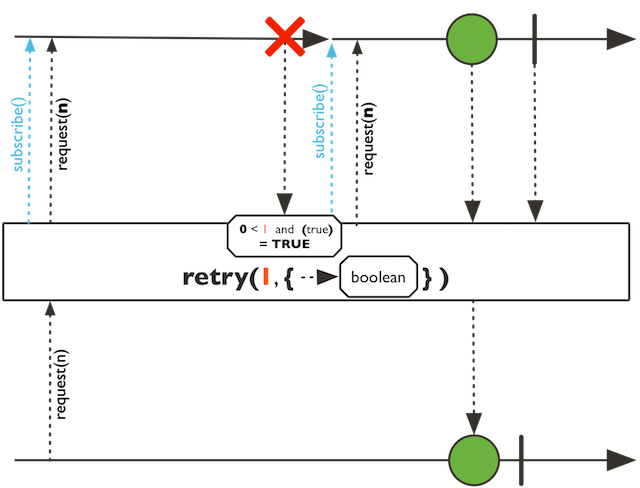
the number of times to tolerate an error
the predicate to evaluate if retry should occur based on a given error signal
a re-subscribing Mono on onError up to the specified number of retries and if the predicate matches.

Re-subscribes to this Mono sequence if it signals any error
and the given Predicate matches otherwise push the error downstream.

Re-subscribes to this Mono sequence if it signals any error either indefinitely or a fixed number of times.

Re-subscribes to this Mono sequence if it signals any error either indefinitely.

Retries this Mono when a companion sequence signals an item in response to this Mono error signal

Subscribe Consumer to this Mono that will consume all the sequence.
Subscribe Consumer to this Mono that will consume all the sequence.
For a passive version that observe and forward incoming data see Mono.doOnSuccess and Mono.doOnError.
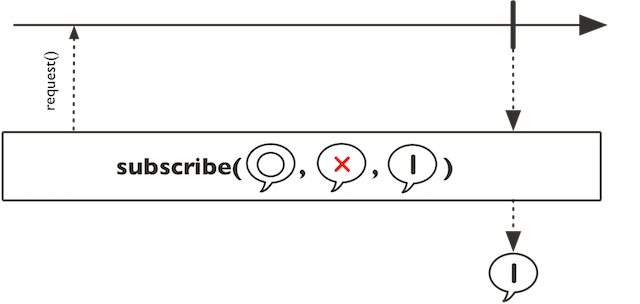
the consumer to invoke on each value
the consumer to invoke on error signal
the consumer to invoke on complete signal
the consumer to invoke on subscribe signal, to be used for the initial request, or null for max request
a new Disposable to dispose the Subscription

Subscribe consumer to this Mono that will consume all the
sequence.
Subscribe consumer to this Mono that will consume all the
sequence.
For a passive version that observe and forward incoming data see Mono.doOnSuccess and Mono.doOnError.

the consumer to invoke on each value
the consumer to invoke on error signal
the consumer to invoke on complete signal
a new Disposable to dispose the Subscription

Subscribe Consumer to this Mono that will consume all the sequence.
Subscribe Consumer to this Mono that will consume all the sequence.
For a passive version that observe and forward incoming data see Mono.doOnSuccess and Mono.doOnError.

the consumer to invoke on each next signal
the consumer to invoke on error signal
a new Runnable to dispose the org.reactivestreams.Subscription

Subscribe a Consumer to this Mono that will consume all the sequence.
Subscribe a Consumer to this Mono that will consume all the sequence.
For a passive version that observe and forward incoming data see Mono.doOnSuccess and Mono.doOnError.

the consumer to invoke on each value
a new Runnable to dispose the Subscription

Subscribe to this Mono and request unbounded demand.
Subscribe to this Mono and request unbounded demand.
This version doesn't specify any consumption behavior for the events from the chain, especially no error handling, so other variants should usually be preferred.
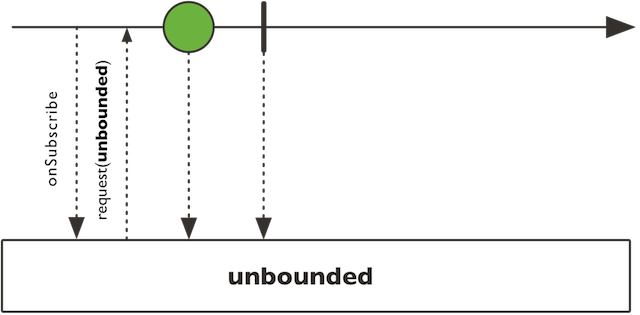
a new Disposable that can be used to cancel the underlying Subscription


Run the requests to this Publisher Mono on a given worker assigned by the supplied Scheduler.

Subscribe the Mono with the givne Subscriber and return it.
Subscribe the Mono with the givne Subscriber and return it.
the reified type of the Subscriber for chaining
the Subscriber to subscribe
the passed Subscriber after subscribing it to this { @link Mono}

Enrich a potentially empty downstream Context by applying a Function1 to it, producing a new Context that is propagated upstream.
Enrich a potentially empty downstream Context by applying a Function1 to it, producing a new Context that is propagated upstream.
The Context propagation happens once per subscription (not on each onNext):
it is done during the subscribe(Subscriber) phase, which runs from
the last operator of a chain towards the first.
So this operator enriches a Context coming from under it in the chain
(downstream, by default an empty one) and passes the new enriched Context
to operators above it in the chain (upstream, by way of them using
Flux#subscribe(Subscriber,Context)).
the function taking a previous Context state and returning a new one.
a contextualized Mono
Context

Enrich a potentially empty downstream Context by adding all values from the given Context, producing a new Context that is propagated upstream.
Enrich a potentially empty downstream Context by adding all values from the given Context, producing a new Context that is propagated upstream.
The Context propagation happens once per subscription (not on each onNext):
it is done during the subscribe(Subscriber) phase, which runs from
the last operator of a chain towards the first.
So this operator enriches a Context coming from under it in the chain (downstream, by default an empty one) and passes the new enriched Context to operators above it in the chain (upstream, by way of them using Flux.subscribe(Subscriber,Context)).
the Context to merge with a previous Context state, returning a new one.
a contextualized Mono
Context

Provide an alternative Mono if this mono is completed without data


Tag this mono with a key/value pair.
Tag this mono with a key/value pair. These can be retrieved as a Stream of all tags throughout the publisher chain by using reactor.core.scala.Scannable.tags() (as traversed by reactor.core.scala.Scannable.parents()).
a tag key
a tag value
the same sequence, but bearing tags

Give this Mono a chance to resolve within a specified time frame but complete if it doesn't.
Give this Mono a chance to resolve within a specified time frame but complete if it doesn't. This works a bit like Mono.timeout(Duration) except that the resulting Mono completes rather than errors when the timer expires.
The timeframe is evaluated using the provided Scheduler.
the maximum duration to wait for the source Mono to resolve.
the Scheduler on which to measure the duration.
a new Mono that will propagate the signals from the source unless
no signal is received for duration, in which case it completes.

Give this Mono a chance to resolve within a specified time frame but complete if it doesn't.
Give this Mono a chance to resolve within a specified time frame but complete if it doesn't. This works a bit like Mono.timeout(Duration) except that the resulting Mono completes rather than errors when the timer expires.
The timeframe is evaluated using the parallel Scheduler.
the maximum duration to wait for the source Mono to resolve.
a new Mono that will propagate the signals from the source unless
no signal is received for duration, in which case it completes.

Give this Mono a chance to resolve before a companion Publisher emits.
Give this Mono a chance to resolve before a companion Publisher emits. If the companion emits before any signal from the source, the resulting Mono will complete. Otherwise, it will relay signals from the source.
a companion Publisher that short-circuits the source with an onComplete signal if it emits before the source emits.
a new Mono that will propagate the signals from the source unless a signal is first received from the companion Publisher, in which case it completes.

Ignore element from this Mono and transform its completion signal into the
emission and completion signal of a provided Mono[V].
Ignore element from this Mono and transform its completion signal into the
emission and completion signal of a provided Mono[V]. Error signal is
replayed in the resulting Mono[V].
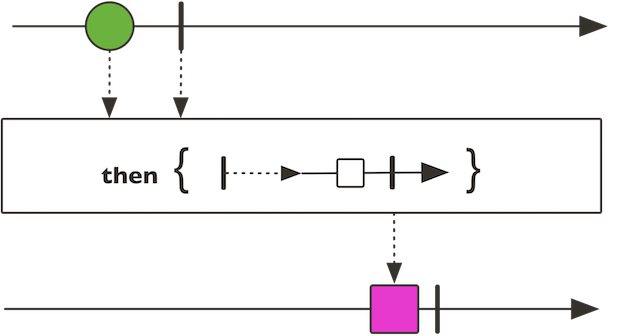

Return a Mono[Unit] which only replays complete and error signals
from this Mono.

Return a Mono[Unit] that waits for this Mono to complete then
for a supplied Publisher[Unit] to also complete.
Return a Mono[Unit] that waits for this Mono to complete then
for a supplied Publisher[Unit] to also complete. The
second completion signal is replayed, or any error signal that occurs instead.
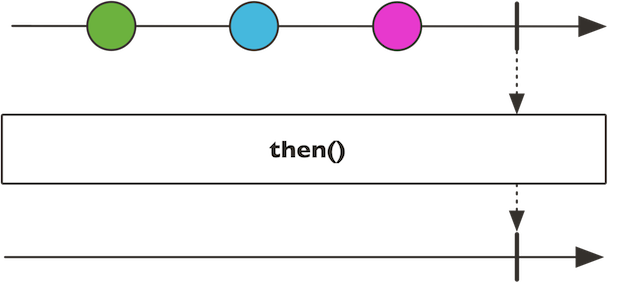
a Publisher to wait for after this Mono's termination
a new Mono completing when both publishers have completed in sequence

Ignore element from this mono and transform the completion signal into a
Flux[V] that will emit elements from the provided Publisher.
Ignore element from this mono and transform the completion signal into a
Flux[V] that will emit elements from the provided Publisher.
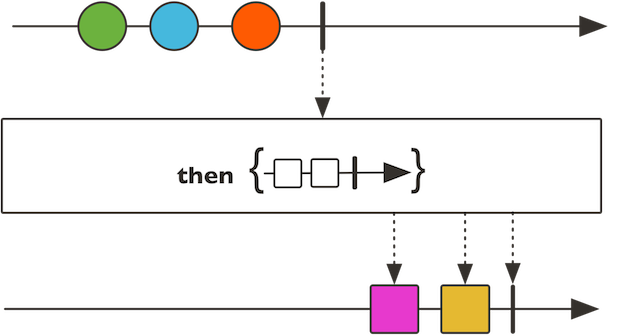
the element type of the supplied Publisher
a Publisher to emit from after termination
a new Flux that emits from the supplied Publisher after this Mono completes.

Switch to a fallback Publisher in case the item from this Mono has not been emitted before the given Publisher emits.
Switch to a fallback Publisher in case the item from this Mono has not been emitted before the given Publisher emits. The following items will be individually timed via the factory provided Publisher.
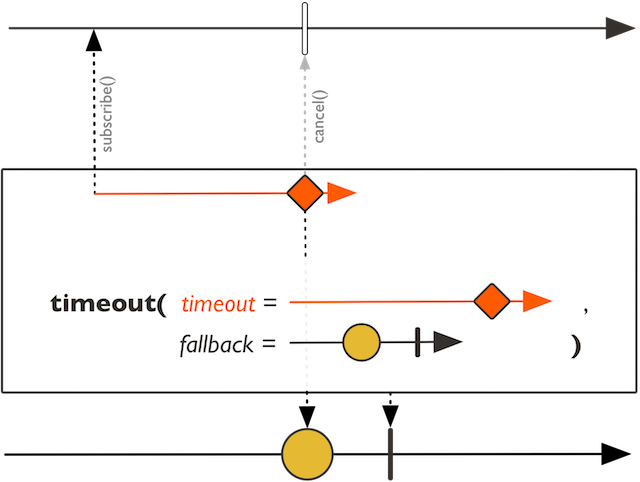

Signal a java.util.concurrent.TimeoutException in case the item from this Mono has not been emitted before the given Publisher emits.
Signal a java.util.concurrent.TimeoutException in case the item from this Mono has not been emitted before the given Publisher emits.
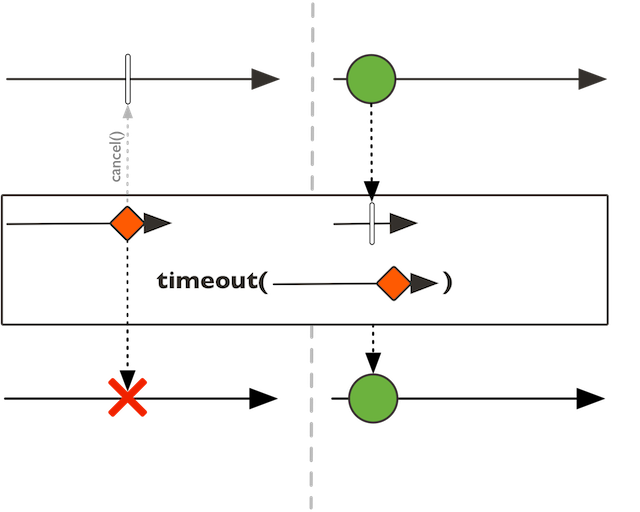

Switch to a fallback Mono in case an item doesn't arrive before the given period.
Switch to a fallback Mono in case an item doesn't arrive before the given period.
If the given Publisher is None, signal a java.util.concurrent.TimeoutException.
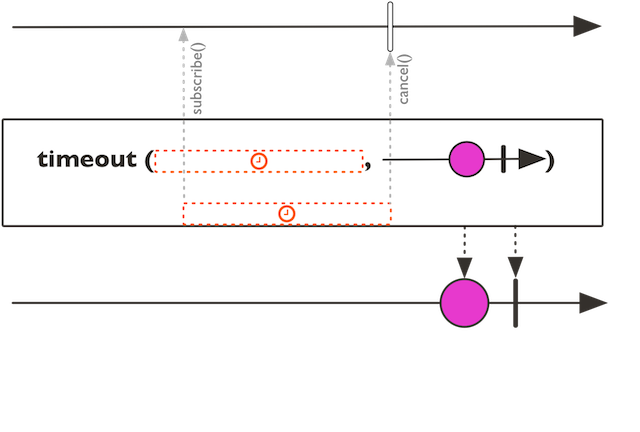

Signal a java.util.concurrent.TimeoutException error in case an item doesn't arrive before the given period.

Switch to a fallback Mono in case an item doesn't arrive before the given period.
Switch to a fallback Mono in case an item doesn't arrive before the given period.
If the given Publisher is null, signal a java.util.concurrent.TimeoutException.


Signal a java.util.concurrent.TimeoutException in case an item doesn't arrive before the given period.

Emit a Tuple2 pair of T1 Long current system time in
millis and T2 T associated data for the eventual item from this Mono

Emit a Tuple2 pair of T1 Long current system time in
millis and T2 T associated data for the eventual item from this Mono

Transform this Mono into a Future completing on onNext or onComplete and failing on onError.
Transform this Mono into a Future completing on onNext or onComplete and failing on onError.
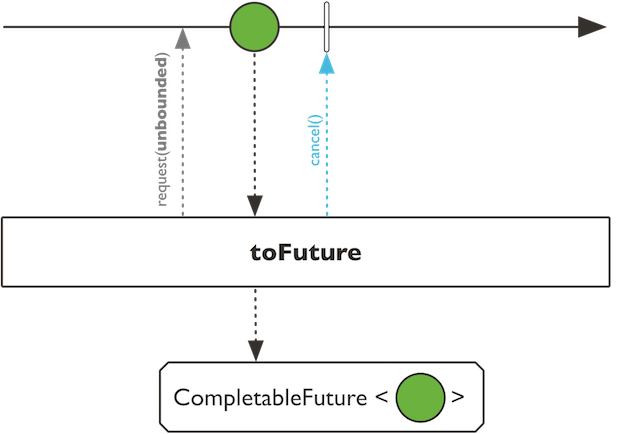
a Future


Transform this Mono in order to generate a target Mono.
Transform this Mono in order to generate a target Mono. Unlike Mono.compose, the provided function is executed as part of assembly.
the item type in the returned Mono
the Function1 to immediately map this Mono into a target Mono instance.
a new Mono
val applySchedulers = mono => mono.subscribeOn(Schedulers.elastic()).publishOn(Schedulers.parallel()); mono.transform(applySchedulers).map(v => v * v).subscribe()
Mono.as for a loose conversion to an arbitrary type
Mono.compose for deferred composition of Mono for each Subscriber



A Reactive Streams Publisher with basic rx operators that completes successfully by emitting an element, or with an error.
The rx operators will offer aliases for input Mono type to preserve the "at most one" property of the resulting Mono. For instance flatMap returns a Flux with possibly more than 1 emission. Its alternative enforcing Mono input is then.
Mono[Unit]should be used for Publisher that just completes without any value.It is intended to be used in implementations and return types, input parameters should keep using raw Publisher as much as possible.
Note that using state in the
scala.Function/ lambdas used within Mono operators should be avoided, as these may be shared between several Subscribers.the type of the single value of this class
Flux